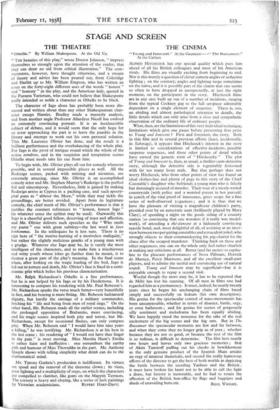THE CINEMA
ALFRED HITCHCOCK has one special quality which puts him ahead of all his British colleagues and most of his American rivals. His films are visually exciting from beginning to end. Nor is this merely a question of clever camera angles or seductive lighting ; on the contrary, angles and lighting verge sometimes on the naive, and it is possibly part of the charm that one seems so often to have dropped in unexpectedly, at just the right moment, on the participants in the story. Hitchcock films are in any case built up out of a number of incidents, ranging from the typical Cockney gag to the full set-piece admirably dependent on a single element of suspense. There is, too, an abiding and almost pathological attention to details, the little details which can only arise from a close and sympathetic observation of the ordinary life of ordinary people.
What, then, are the limitations of this very individual technique, limitations which give one pause before presenting first prize to Young and Innocent ? First and foremost, the story. Both in this film and in several previous efforts (least, incidentally, in Sabotage), it appears that Hitchcock's interest in the story is limited to considerations of effective incidents, possible suspense sequences, and those other points of detail which have earned the generic term of " Hitchcocky." The plot of Young and Innocent is, then, as usual, a thriller-cum-detective story, although the detective side is regrettably festooned with far too many loose ends. But that perhaps does not worry Hitchcock, who from other points of view has found an ideal clothes-line and plenty of pegs in this story of the Chief Constable's daughter who befriends a young man who is falsely but damningly accused of murder. Their tour of a nicely-varied countryside (with police and a worried parent in hot pursuit) in search of the vital proof of innocence, gives scope for a fine series of well-observed sequences ; and it is thus that we have the pleasure of visiting a magnificent children's party, presided over by an autocratic aunt (brilliantly played by Mary Clare), of spending a night on the goods siding of a country station ,'so convincing that one wonders if it really was model- work), of attending a the-dansant at a hideously convincing seaside hotel, and, most delightful of all, of assisting at an inter- view between two perspiring constables and a truculent yokel, who strongly objects to their commandeering his pig-chariot for the chase after the escaped murderer. Thinking back on these and other sequences, one can on the whole only feel rather churlish at making any criticisms at all. Better (and far easier) to capitu- late to the pleasant performances of Nova Pilbeam, Derrick de Marney, Percy Marmont, and all the excellent small-part players, and to admire the tactful and convincing use of natural sound. Young and Innocent may be superficial—but it is enjoyable enough to repay a second visit.
Woeful though the news may be, it has to be reported that de Mille has lost his cunning. Of all men in films one had regarded him as a permanency. It must, indeed, be nearly twenty years since he began his unchanging chain of films based simply and successfully on hokum (his own description). His genius for the spectacular control of mass-movements has been unsurpassable, whether in terms of disaster, battle, orgy, or even bathroom ; and his genius for scenes of gorgeously silly sentiment and melodrama has been equally abiding. We have happily stood the nonsense for the sake of the real excitement of the big scenes and the big sets. But in The Buccaneer the spectacular moments are few and far between, and when they come they no longer grip as of yore ; whether because they are not so good, or because the rest of the film is so tedious, is difficult to determine. The film lasts nearly two hours and leaves only two gracious memories ; first of Akira Tamiroff puffing out his cheeks in bewilderment as the only genuine product of the Spanish Main amidst an orgy of amateur theatricals, and second the really humorous efforts of the director to get the best of both worlds in depicting the battle between the seceding Yankees and the British ; it must have broken his heart not to be able to call the fight a draw, but history is inexorable, and he had to retain the affection of the British box-office by flags and bagpipes and


















































 Previous page
Previous page